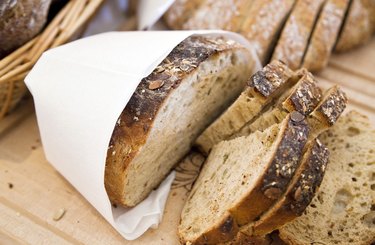
Temporomandibular joint and muscle disorders involve the chewing muscles and joints connecting the lower jaw to the skull. Although TMJ is technically the abbreviation for the joint, people commonly use this term as shorthand for the disorders and symptoms, says MedlinePlus. Diet changes can prevent episodes of TMJ and help ease symptoms.
Identification
Video of the Day
The temporomandibular joints are located on each side of your head in front of your ears, connecting your lower jaw to your skull. A small cartilage disc separates the bones so the lower jaw slides easily. You move these joints every time you chew, swallow and talk, so they are used very frequently, explains an April 12, 2008, article in "Dental Health Magazine" published at Worldental.org.
Video of the Day
Symptoms
Symptoms of TMJ can include jaw discomfort and tenderness or pain when opening or closing the mouth. You may find it uncomfortable to chew, or there may be popping or grating sounds when you move your jaw. TMJ can cause headaches, earaches, facial pain and neck, shoulder and back pain. Symptoms can be caused or worsened by physical stress on structures around the joint, poor posture, neck and facial muscle strain, lack of sleep, life stress and poor diet, according to MedlinePlus.
Foods to Avoid
You may need to try eliminating different foods from your diet to see if this decreases your problems with TMJ. Foods containing salicylates can be a problem, according to the "Dental Health Magazine" article. Salicylates occur in many vegetables, and numerous fruits are high in this substance. Jams, jellies and juice tend to be high in salicylates, and so are hot peppers, olives, radishes, tomatoes, endive, chicory and water chestnuts. Other foods that can aggravate TMJ include wheat and dairy foods, foods with high levels of vitamin C or iron and products that contain sugar, yeast or preservatives.
Foods to Include
Including certain foods in your diet may prevent TMJ symptoms, according to "Dental Health Magazine." Eat organ meat now and then and include more red meat and more fat in your diet, particularly moderate amounts of saturated fat. In addition, make broth from animal bones and tendons to extract hyaluronic acid for joint health and add lots of greens for magnesium content.
Diet as Treatment
To lessen pain and other symptoms during an occurrence of TMJ, avoid eating hard foods, crunchy foods, thick or large foods that involve opening your mouth wide and foods that require a lot of chewing. This gives your jaw and temporomandibular joints the opportunity to rest and heal, says Colgate. Some good foods include cooked vegetables and fruits, cottage cheese, mashed potatoes, scrambled eggs, smoothies, soup and yogurt. If you must eat food that requires chewing, cut it into small pieces.
Related Reading
TMJ is the abbreviation used to describe temporomandibular joint disorder. The temporomandibular joints are your lower jaw joints; they connect your jaw to your head. People who suffer from TMJ experience pain and often loud popping or cracking noises when chewing and yawning. Pain can be focused in the jaw area but can also extend up the head, leading to headaches and earaches in some people. TMJ is a chronic condition that may require a combination of medical and self-care measures. You can adjust your diet to avoid certain foods that exacerbate your condition.
Crunchy
Crunchy foods, including popcorn, chips and other salty snack foods, and hard rolls may be too difficult for your jaw to chew when you have TMJ. Hard vegetables like carrots and crisp celery can also cause pain in the jaw due to the intensity with which you need to bite down on them. Eating softer foods or cooking vegetables to a softer texture can ease the muscle tension in your jaw and give the temporomandibular joints the rest they need to recover. The flavonoid content in fruits and vegetables can act as a natural anti-inflammatory agent, reports the University of Maryland Medical Center, so it is important to keep these foods in your diet.
Chewy
Your jaw works overtime when you consume chewy foods such as taffy, caramel, chewing gum, tougher cuts of meat and delicacies like lobster and escargot. The constant motion of your jaw can aggravate your joint pain when chewy foods are a staple of your diet. Instead of items that make your jaw work hard, opt for softer foods like bananas, yogurt, mashed potatoes, tender meats, poultry and fish.
Fatty
The University of Maryland Medical Center suggests that cutting back on the amount of fat in your diet may ease TMJ symptoms. Saturated fat, often found in fried foods, cream sauces, pastries and red meat, may lead to increased inflammation in the body. Drink low-fat or skim milk, choose lean proteins such as chicken, pork and fish and choose low-fat cheese and yogurts to reduce the fat content in your meals.
Large Pieces
Some people with TMJ cannot open the jaw more than a couple of inches when pain is at its worst. Even if this is not your particular problem with TMJ pain, biting into whole pieces of fruit, thick sandwiches or other foods that are large in size can overtax your jaw. The annoying and painful popping and grinding noises associated with TMJ can occur not only while you eat or yawn, but also when you open your mouth wide. The solution to this problem is simply cutting your food into smaller pieces.
Considerations
Vitamin and mineral supplements may help relieve some of the pain of TMJ. The April 2008 issue of "Dental Health" magazine suggests eating leafy greens that contain magnesium. Taking a magnesium supplement may also relax your tense and tired jaw muscles. UMMC reports that vitamin C supplements may also contribute to good joint health and may alleviate some of your symptoms.
Is this an emergency? If you are experiencing serious medical symptoms, please see the National Library of Medicine’s list of signs you need emergency medical attention or call 911.